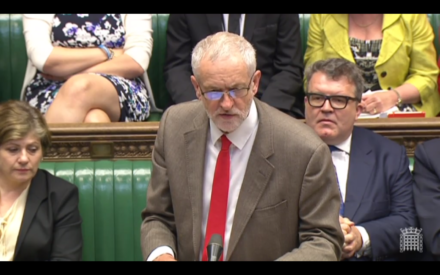
A stranger from another land who walked into the Commons chamber might have found it to be an unremarkable day. To anyone who had spent the last week in Britain, however, it was 30 minutes laced with menace.
For either observer, it would have been a muted affair. But the stew of political frustrations, feuds and rivalries bubbled below the surface as rarely before.
Jeremy Corbyn asked six sober questions on substantial subjects. He was rewarded with serious answers – at least, until the last one, when David Cameron finally let rip over the leadership crisis – ours, not his – telling the leader of the Opposition to act in the “national interest” and then his long-planned pay-off: “For Heaven’s sake man, go.”
MPs roared – although it was difficult to tell the source of the noise. It was most likely from the Tory benches, however, because Labour MPs were sitting in near silence. It was one of the quietest sessions of Prime Minister’s Questions I have seen.
No need to explain why that was. Corbyn has been stung after being soundly beaten in yesterday’s vote of confidence. He cannot fill the frontbench roster of around 95 positions but is trying to make it clear he is not bothered by the swarm of refuseniks and resignations.
Corbyn asked his six questions on heavyweight subjects like job insecurity after the Brexit vote, the downgrade to Britain’s credit rating, the number of children living in poverty and the grim rise in racist incidents since last Thursday’s referendum. These are all social and economic problems which would worry Labour voters and which won’t be helped by the country’s decision to pull out of the EU.
“Will the prime minister consider suspending the Chancellor’s fiscal rule which is in effect preventing investment from taking place?”
It wasn’t a zinger but, in a week of Labour turmoil, Corbyn took the correct approach in trying to show the world he is getting on with the job of tackling the Tories on the back of the huge mandate he received last summer.
Not for the first time, however, there was a line in his questions that came back to bite him. A later reference to the number of people living in “insecure work” in particular brought laughter from the Tories and a few grimaces from the benches behind Corbyn.
It is not a happy time for either Corbyn or his critics. Tom Watson, the man who continues to serve Corbyn and who will be central to the future of the leader and the party, was next to his boss while Angela Eagle, the other former minister who has been mooted as a challenger, sat several rows back. Jokes about Eagle hovering above Corbyn, soaring, or falling to earth have not been in short supply this week.
Eagle was not the only big name on the backbenches and other recently resigned shadow Cabinet ministers could be seen dotted around, such as Heidi Alexander and Lisa Nandy, as well as several of those from the “declined to serve” category, such as Dan Jarvis.
It was a sombre session. And it wasn’t one in which you could pick the traditional winners and losers. It was a day on which anyone looking for answers as to the future of Corbyn, and the party, might have been disappointed. At least if they were in the Chamber. One senses that the real business – discussions about Corbyn, with Corbyn, among Corbynistas and between Corbyn critics – were going on elsewhere. What comes next? Nobody seems to know. With no formal challenge yet to the leader, the world waits for the next move from the rebels.




More from LabourList
‘Tackling poverty should be the legacy of Keir Starmer’s government’
‘The High Court judgment brings more uncertainty for the trans community’
‘There are good and bad businesses. Labour needs to be able to explain the difference’